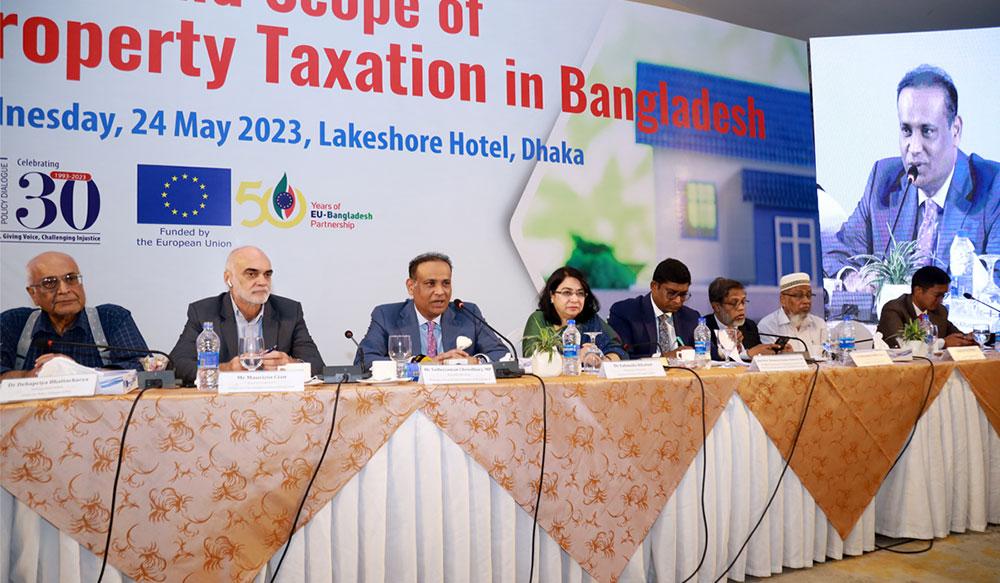
The low tax-GDP ratio of Bangladesh, registering around 7-8% throughout the last decade, is emerging as a structural constraint for its development aspirations. Revenue collection of Bangladesh largely relies on indirect taxes. The share of direct tax has been stagnant at around 33% for the last five fiscal years and it is overwhelmingly based on income. Besides, wealth accumulation per adult in Bangladesh is more than two times faster than income which indicates that the rising income inequality of the country is driven by higher wealth concentration. Hence, it underpins the need to tax wealth/property to redistribute resources among the most vulnerable and marginalised population of society through enhanced public service delivery.
In this context, the Centre for Policy Dialogue (CPD) with the support of the European Union (EU) conducted a study on property tax. CPD with the support of the European Union (EU) has organised a dialogue on the ‘State and Scope of Property Taxation in Bangladesh’ to disseminate the findings of the study on Wednesday, 24 May 2023.
Dr Fahmida Khatun, Executive Director, CPD, who chaired the dialogue, highlighted the importance of creating an updated roadmap for overall tax collection and management, considering the 2041 development agenda and LDC graduation context.
Dr Debapriya Bhattacharya, Distinguished Fellow, CPD, in his keynote presentation mentioned about the high dependence of existing tax structure on indirect tax, the rising wealth and income inequality, the position of property tax in global tax structure and composition of property tax practiced globally. He highlighted that property tax is an important source of revenue for average OECD countries after income tax, VAT, and excise taxes, comprising 5.6% of the overall tax revenue (as per 2021 data). In contrast, property tax accounts for only 0.34% of its total tax revenue in Bangladesh.
Dr Debapriya also stated about strengthening the existing property taxes in Bangladesh emphasising the importance of property tax in global economy, particularly the importance of land tax and holding tax which are the most important property taxes in average OECD countries. He highlighted the significance of local government’s role in tax collection by citing the experience of specific OECD countries. He concluded his discussion by calling attention to the importance of reforming property tax following three fundamental principles (equity, efficiency, and transparency) and introducing Inheritance Tax given its global importance.
Mr Saifuzzaman Chowdhury MP, Hon’ble Minister, Ministry of Land, Government of Bangladesh, the Chief Guest, expressed his support for the introduction of Inheritance Tax in Bangladesh. Conversely, Dr Nasiruddin Ahmed, the former Chairman of the National Board of Revenue (NBR), acknowledged the need for an Inheritance Tax but stressed on the significance of simplifying the existing property tax system before introducing it.
Barrister Shameem Haider Patwary, MP, Member, Parliamentary Standing Committee on Ministry of Law, Justice and Parliamentary Affairs mentioned about the absence of democratic practices and poor governance in creating a sluggish economy, largely relying on loans rather than tax revenue.
‘Property tax can reduce inequality and it is growth friendly because it puts assets into motion’ said by the Guest of Honour, Mr Maurizio Cian, Head of Cooperation, Delegation of the European Union to Bangladesh.
Dr Muhammad Abdul Mazid, Former Chairman, National Board of Revenue highlighted about strengthening property tax collection to combat the illegal and improper accumulation of wealth, creating a comprehensive and integrated tax system, evading registration fees to remain out of the tax net and undervaluation issues related to properties. The large discrepancy between mouza rate and actual market price, the dependence on deed value for tax rate assessment without adjustment to current market price and absence of regular valuation have also been raised by other panellists and discussants.
Dr Ahsan Habib Mansur, Executive Director, Policy Research Institute (PRI) particularly emphasised about land tax with a view to scale down rapid growth of wealth in Bangladesh. He suggested that enforcing tax imposition on land may discourage landowners from having land without improvement and encourage them for making productive activities or to increase investment.
Mr Snehasish Barua, FCA, ACA (ICAEW), Partner, Snehasish Mahmud & Co. opined that it is essential to rationalise the exemptions of property taxation, ensuring a fair and balanced approach. He further stated about creating interoperability among tax administrations to minimise institutional complexities and improve efficiency. The importance of interoperability between and intra-operability within the multiple property tax administrations synchronising NID, TIN, and Bank accounts has been raised in the dialogue number of times by the respected panellists and other discussants.
Professor Mustafizur Rahman, Distinguished Fellow, CPD acknowledged the importance of property tax quoting the theory of Thomas Picketty and agreed to the proposition that property tax should be seen as a potential source of revenue given the current wealth and income inequality scenario of Bangladesh.
Several prominent former government officials, academicians, researchers, advocates, and business leaders also contributed to the dialogue with their special remarks.

